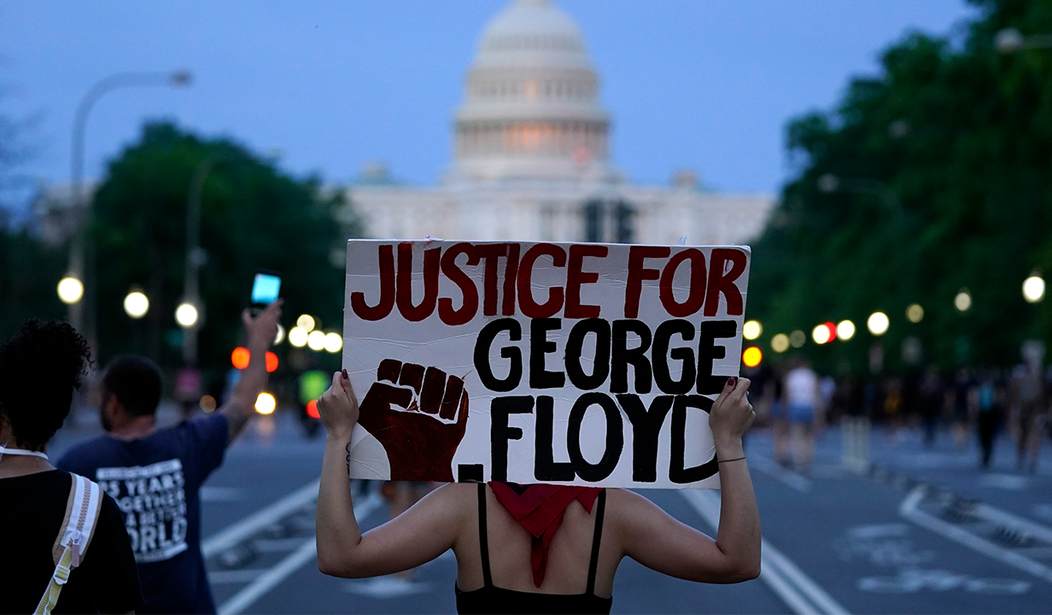Former cop Derek Chauvin has been granted a chance to take a look at George Floyd's heart to explore an alternate theory of why the man died in police custody. The federal judge's move on Monday will allow Chauvin's lawyers to determine if the former cop's knee on his upper back killed him or if the fentanyl and other drugs he was on exacerbated an already weakened heart and created a condition that ended in his death.
This move also gives the country another chance to look with more sobriety and less emotion at Floyd's death, which birthed hundreds of riots, resulted in more than $2 billion in damage to other people's property, and sparked rage and endless virtue signaling. Oh, and it birthed lies. Lots of lies.
Chauvin's trial occurred in a cauldron of hate. When the jury filed into the barricaded courthouse complex just blocks from where the riots had burned down buildings, including a police station and Target store, they could hear screaming protesters —a reminder of the violence Floyd's death triggered. The judge refused to move the trial to another, nearby county and out of the center of the unrest. He refused to delay the case.
Chauvin's one attorney was up against the Antifa-friendly Attorney General Keith Ellison, placed in charge of the case by Gov. Tim Walz. Ellison convinced the judge that the county attorney was not up to the task of trying Chauvin. Ellison chose an all-star panel of lawyers — at least one flown in from D.C. — to try the case. Hovering over the events was race-grifting Benjamin Crump. The five acting prosecuting attorneys routinely dumped hundreds of pages of discovery on Chauvin's lone attorney's desk on the eve of calling important witnesses.
Chauvin was convicted of killing Floyd and then convinced he should serve all his time in a federal lock-up instead of a worse state prison, and he pleaded guilty to depriving Floyd of his civil rights.
But in a court filing, Chauvin claims his attorney never told him about the heart condition that could have changed the entire case. The federal judge approved giving Chauvin and his experts samples of bodily fluids and access to the heart tissue which lies at the center of his appeal.
JUST IN: In new court ruling, Derek Chauvin will be allowed to test heart tissue of George Floyd. pic.twitter.com/51Kzl1qoIP
— Liz Collin (@lizcollin) December 16, 2024
Floyd had several heart ailments, as we've reported, and as the medical examiner's report showed. The medical examiner previously said that if Floyd had been presented to him without the other drama surrounding the death, he would have called the cause of death a drug overdose.
Floyd was full of drugs — fentanyl and methamphetamine and THC. He tested positive for COVID and had a heart attack. Was Chauvin completely responsible for killing him?
Related: Worlds Collide: George Floyd Tested Positive for COVID and Had Heart Attack
A store owner reported Floyd, his drug dealer who was with him, and a woman for passing fake $20 bills.
When Floyd was stopped by police and put in the back of a patrol car, police found spent baggies of drugs. It's believed that the 6'4" 223-pound Floyd ate the drugs to hide evidence. He was taken out of the car when he asked to lie down. He thrashed around despite being told to lie still, and 140 pound Chauvin held him down with his knee. Though the initial reports said Chauvin's knee was on Floyd's neck, evidence at trial showed that Chauvin's knee was not on Floyd's neck, but on his upper back.
National Review reported that Chauvin's theory is that the totality of the circumstances created a heart condition not discussed at trial.
In a November 2023 motion to vacate the federal sentence, Chauvin said he wouldn’t have entered a guilty plea if he knew about the theories of Kansas pathologist Dr. William Schaetzel regarding Floyd’s cause of death. The doctor believes Floyd died from a high level of catecholamines — neurohormones that are triggered in stress responses — or takotsubo cardiomyopathy — a heart condition that develops in response to severe emotional or physical distress.
The medical report also showed that Floyd had a tumor on his leg. Reporter Liz Collin reported Chauvin "never would have pleaded guilty to the federal charges if he was aware of a Kansas pathologist’s opinion that Floyd may have died from complications of a rare tumor called a paraganglioma." The pathologist, Dr. William Schaetzel, told defense attorney Erik Nelson about the tumor but didn't pass on the significance of it to Chauvin.
Chauvin's appeal was slowed after he was stabbed 22 times while sitting at the law library at a federal lockup in Arizona. He was later moved to a facility in Texas.
Will taking another look at this case reopen old wounds? Or will it reopen the minds of the American public that all was not as it seemed during the Summer of Love?










Join the conversation as a VIP Member